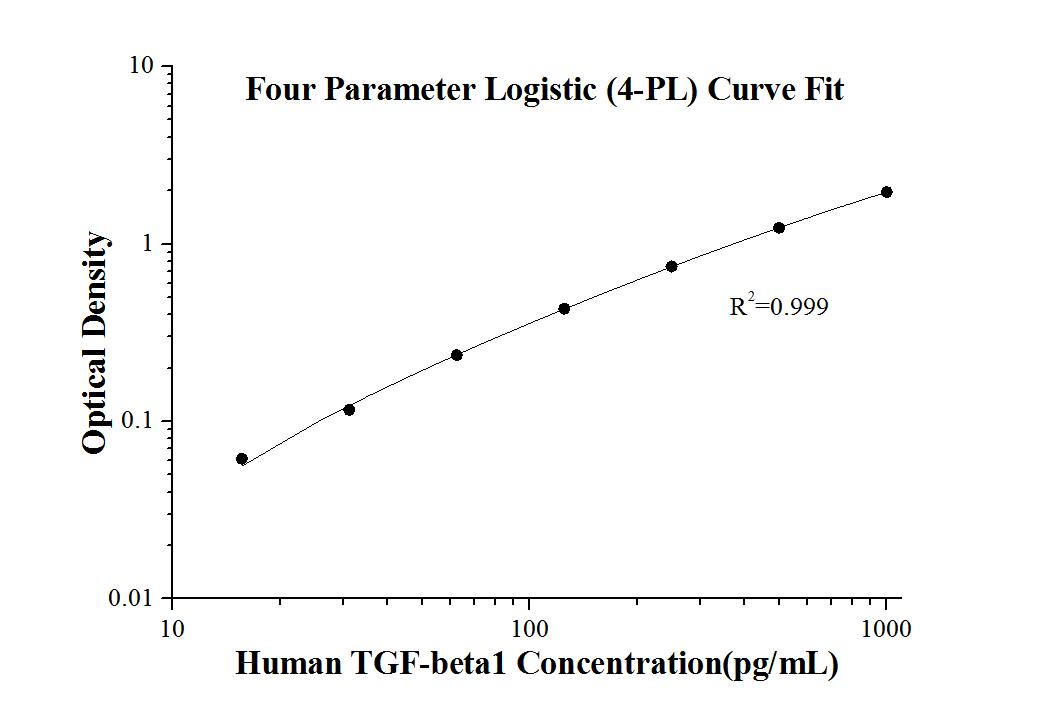Human TGF-beta1 ELISA Kit
Cat no : KE00002
Synonyms
1, CED, DPD1, LAP, TGF ?1, TGF beta 1, TGF- beta 1, TGFB, TGFB1, TGFbeta, TGF-beta 1, TGF-beta1, TGFβ1, TGF-β1
Validation Data Gallery
Product Information
KE00002 is a solid phase sandwich Enzyme Linked-Immuno-Sorbent Assay (Sandwich ELISA). The TGF-beta1 ELISA kit is to be used to detect and quantify protein levels of endogenous TGF-beta1. The assay recognizes human TGF-beta1. An antibody specific for TGF-beta1 has been pre-coated onto the microwells. The TGF-beta1 protein in samples is captured by the coated antibody after incubation. Following extensive washing, another antibody of biotinylated specific for TGF-beta1 is added to detect the captured TGF-beta1 protein. For signal development, Streptavidin-HRP is added, followed by Tetramethyl-benzidine (TMB) reagent. Solution containing sulfuric acid is used to stop color development and the color intensity which is proportional to the quantity of bound protein is measurable at 450 nm with the correction wavelength set at 630 nm. This ELISA kit is cross-reactive with bovine, porcine, equine, and caprine. Therefore, the culture medium should not contain serum components associated with the above species.
| Product name | Human TGF-beta1 ELISA Kit |
| Tests | 1 X 96 well plate |
| Sample type | Serum, Plasma, Cell culture supernatants, Urine |
| Assay type | Sandwich |
| Sensitivity | 3.3 pg/mL |
| Range | 15.6-1000 pg/mL |
| Reactivity | Human |
| Tested applications | Sandwich ELISA |
| Gene ID (NCBI) | 7040 |
Recovery
| Sample Type | Average | Range |
|---|---|---|
| Urine | 93% | 86%-101% |
| Human plasma | 100% | 81%-111% |
| Cell culture supernatants | 105% | 93%-115% |
IntraAssay
| Sample | n | mean ( pg/mL) | SD | CV% |
|---|---|---|---|---|
| 1 | 20 | 632.6 | 28.2 | 4.5 |
| 2 | 20 | 81.2 | 3.9 | 4.8 |
| 3 | 20 | 18.5 | 0.9 | 4.9 |
InterAssay
| Sample | n | mean ( pg/mL) | SD | CV% |
|---|---|---|---|---|
| 1 | 24 | 659.6 | 62.0 | 9.4 |
| 2 | 24 | 83.3 | 4.5 | 5.5 |
| 3 | 24 | 15.5 | 0.3 | 2.0 |
Background Information
TGF-beta is a member of the transforming growth factor beta (TGFB) family of cytokines, which are multifunctional peptides that regulate proliferation, differentiation, adhesion, migration, and other functions in many cell types. TGF-beta is produced by a number of cell types including regulatory T cells, fibroblasts, epithelial cells, and endothelial cells. TGF-beta acts synergistically with TGFA in inducing transformation. It also acts as a negative autocrine growth factor. TGF-beta plays an important role in bone remodeling as it is a potent stimulator of osteoblastic bone formation, causing chemotaxis, proliferation and differentiation in committed osteoblasts. TGF-beta appears to promote late stage progression and metastasis in some cancers.
Properties
| Storage Instructions | All the reagents are stored at 2-8℃ for 6 months or -20℃ for 12 months. Refer to the protocol for further storage instructions. |
| Synonyms | 1, CED, DPD1, LAP, TGF ?1, TGF beta 1, TGF- beta 1, TGFB, TGFB1, TGFbeta, TGF-beta 1, TGF-beta1, TGFβ1, TGF-β1 |
Publications
| Species | Sample Type | Title |
|---|---|---|
Mol Ther Exosomal miR-1246 from glioma patient body fluids drives the differentiation and activation of myeloid-derived suppressor cells. | ||
J Am Soc Nephrol MicroRNA-23b Targets Ras GTPase-Activating Protein SH3 Domain-Binding Protein 2 to Alleviate Fibrosis and Albuminuria in Diabetic Nephropathy. | ||
Cancer Lett Small extracellular vesicle-packaged TGFβ1 promotes the reprogramming of normal fibroblasts into cancer-associated fibroblasts by regulating fibronectin in head and neck squamous cell carcinoma. | ||
Cancer Lett MiR-26b-5p in small extracellular vesicles derived from dying tumor cells after irradiation enhances the metastasis promoting microenvironment in esophageal squamous cell carcinoma. | ||
Cancer Lett NEO212, a conjugate of temozolomide and perillyl alcohol, blocks the endothelial-to-mesenchymal transition in tumor-associated brain endothelial cells in glioblastoma. |
